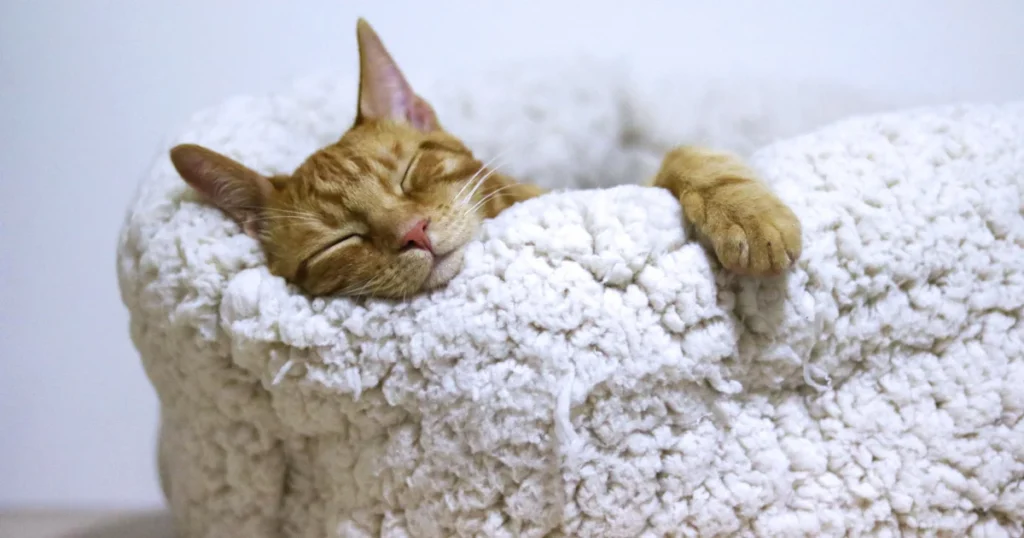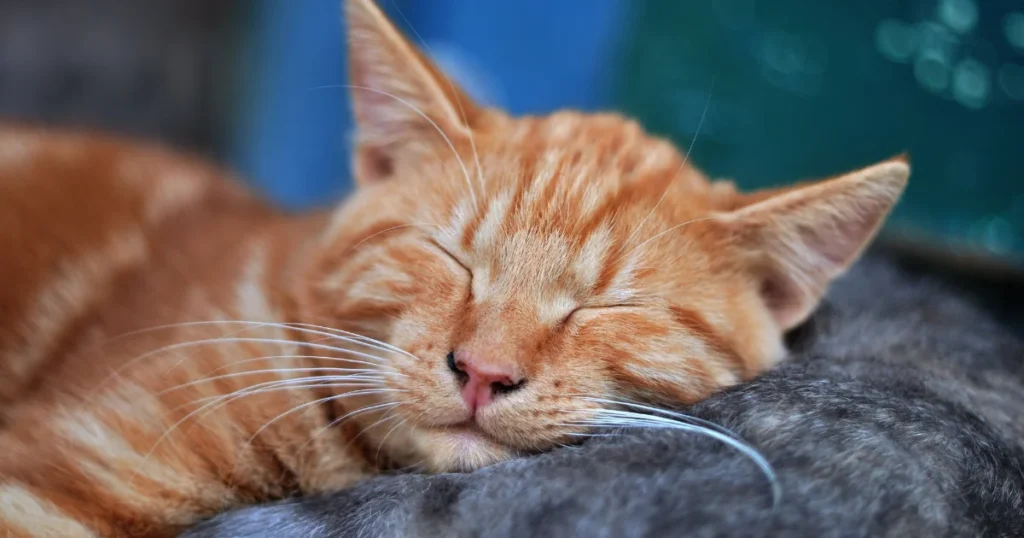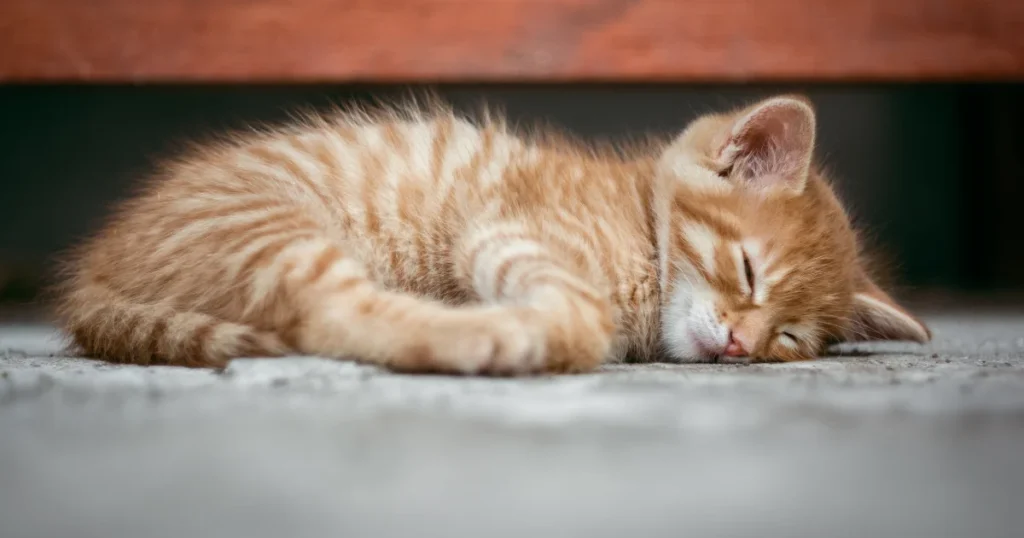Key Takeaways
Is it normal for cats to snore? Yes, it is a relatively common occurrence in some cats, although not all cats snore. While younger kittens may be less prone to snoring, older cats are more likely to exhibit this behavior.
There are several factors that can contribute to cat snoring. One common cause is obesity, which can lead to excess tissue in the throat and airway obstruction, resulting in snoring. It’s important to note that obesity in cats can also lead to various other health issues, so maintaining a healthy weight is crucial.
Nasal congestion is another potential cause of snoring in cats. This congestion can be caused by allergies or respiratory infections, which may result in a stuffy nose and difficulty breathing through the nasal passages. In such cases, snoring can be a symptom of the underlying issue.
The sleeping position of a cat can also play a role in snoring. Certain positions, such as sleeping with the head in an awkward angle or with the chin pressed against the chest, can cause the airway to become obstructed, leading to snoring.
In some cases, cat snoring may be a sign of a more serious condition called sleep apnea. Sleep apnea is characterized by interrupted breathing during sleep, and if left untreated, it can have negative effects on a cat’s overall health and well-being.
Additionally, snoring in cats can sometimes indicate underlying heart problems or respiratory infections. It’s important to monitor your cat’s overall health and consult a veterinarian if you notice any persistent or concerning snoring patterns, especially if accompanied by other symptoms such as coughing, difficulty breathing, or changes in behavior.
Also read: Why is My Cat Crying After Eating?

Causes of Cat Snoring
Obesity
Obesity is one of the leading causes of cat snoring. When cats are overweight, excess fat can accumulate in their throat and airways, causing them to snore. Maintaining a healthy weight is crucial for preventing snoring in cats.
- Cats that are overweight are more likely to snore.
- Obesity can lead to respiratory problems and sleep apnea in cats.
- Feeding your cat a balanced diet and providing regular exercise can help prevent obesity and reduce snoring.
Tip: Consult with your veterinarian to determine the appropriate diet and exercise plan for your cat to maintain a healthy weight.
Nasal Congestion
Nasal congestion is a common cause of snoring in cats. When a cat’s nasal passages are blocked or inflamed, it can lead to difficulty breathing and snoring. Allergies, sinus infections, or foreign objects lodged in the nasal passages can all contribute to nasal congestion in cats.
- Cats with flat faces or short noses are more prone to nasal congestion due to their anatomy.
- Excessive mucus production can also cause nasal congestion in cats.
If you notice your cat snoring and suspect nasal congestion as the cause, it is important to consult with a veterinarian. They can help identify the underlying cause and provide appropriate treatment to alleviate the congestion and improve your cat’s breathing.
Sleeping Position
Cats can adopt various sleeping positions, and each position can affect their snoring. Certain sleeping positions can lead to obstruction of the airway, resulting in snoring. Here are some common sleeping positions and their impact on snoring:
- Flat on the back: This position can cause the tongue to fall back and partially block the airway, leading to snoring.
- Curled up: When cats curl up tightly, it can restrict their breathing and contribute to snoring.
- On the side: Sleeping on the side can help keep the airway open and reduce snoring.
To help alleviate snoring caused by sleeping position, you can try providing your cat with a comfortable and supportive bed that encourages side sleeping. Additionally, ensuring a clean and dust-free sleeping environment can help reduce nasal congestion and improve breathing. Remember, if your cat’s snoring persists or worsens, it’s always best to consult with a veterinarian for further evaluation and guidance.
Also read: Why is My Cat Crying After Eating?

Health Risks Associated with Cat Snoring
Sleep Apnea
Sleep apnea is a serious condition that can affect cats. It is characterized by pauses in breathing during sleep, which can lead to a lack of oxygen in the body. Obstructive sleep apnea is the most common type in cats, where the airway becomes partially or completely blocked. This can happen due to factors such as obesity or narrow nasal passages.
- Cats with sleep apnea may snore loudly and have episodes of gasping or choking during sleep.
- They may also exhibit excessive daytime sleepiness and fatigue.
- Sleep apnea can put a strain on the heart and respiratory system, leading to an increased risk of heart problems and respiratory infections.
If you suspect that your cat may have sleep apnea, it is important to consult with a veterinarian. They can provide a proper diagnosis and recommend appropriate treatment options to improve your cat’s quality of sleep and overall health.
Heart Problems
Heart problems in cats can be a serious health issue. Hypertrophic cardiomyopathy is one of the most common heart conditions in cats. It is a thickening of the heart muscle that can lead to heart failure. Other heart problems that can cause snoring in cats include congenital heart defects and valvular heart disease.
If your cat is snoring and you suspect it may be due to heart problems, it is important to consult with a veterinarian. They can perform a thorough examination and recommend appropriate treatment options. Treatment for heart problems in cats may include medications to manage symptoms, dietary changes, and lifestyle modifications.
Tips for managing heart problems in cats:
- Follow your veterinarian’s recommendations for medication and treatment.
- Monitor your cat’s weight and ensure they maintain a healthy weight.
- Provide a low-sodium diet to reduce fluid retention.
- Keep your cat’s environment stress-free and provide plenty of opportunities for relaxation.

Respiratory Infections
Respiratory infections can be a common cause of cat snoring. These infections can affect the upper respiratory system, including the nose, throat, and lungs. Bacterial or viral infections can lead to inflammation and congestion, causing the cat to snore. It is important to note that respiratory infections can be contagious among cats, so it is crucial to isolate an infected cat to prevent the spread of the infection.
- Cats with respiratory infections may exhibit symptoms such as sneezing, coughing, nasal discharge, and difficulty breathing.
- Treatment for respiratory infections may include antibiotics, antiviral medications, and supportive care to alleviate symptoms and promote healing.
If you suspect that your cat has a respiratory infection, it is best to consult with a veterinarian for a proper diagnosis and appropriate treatment.
Conclusion
In conclusion, cat snoring can be caused by various factors such as obesity, nasal congestion, and sleeping position. It is important to be aware of the potential health risks associated with cat snoring, including sleep apnea, heart problems, and respiratory infections. If you notice your cat snoring excessively or experiencing any related symptoms, it is recommended to consult with a veterinarian for proper diagnosis and treatment. Remember, a healthy and well-rested cat is a happy cat!
Frequently Asked Questions
- Is it normal for cats to snore?
Yes, occasional snoring in cats can be normal, especially if they are in a deep sleep. However, if the snoring is loud, persistent, or accompanied by other symptoms, it may indicate an underlying health issue.
- What are the common causes of cat snoring?
Common causes of cat snoring include obesity, nasal congestion, and sleeping position. These factors can restrict the airflow and lead to snoring.
- Can obesity cause cat snoring?
Yes, obesity is a common cause of cat snoring. Excess weight can put pressure on the airways, making it difficult for the cat to breathe properly and resulting in snoring.
- How can I help my snoring cat?
If your cat is snoring due to obesity, you can help by providing a balanced diet and encouraging regular exercise. If the snoring is caused by nasal congestion, you can try using a humidifier or consulting a veterinarian for appropriate treatment.
- Can cat snoring be a sign of health problems?
Yes, cat snoring can be a sign of health problems such as sleep apnea, heart problems, or respiratory infections. If the snoring is severe, persistent, or accompanied by other concerning symptoms, it is recommended to consult a veterinarian for proper diagnosis and treatment.
- Should I be concerned if my cat snores?
If your cat snores occasionally and is otherwise healthy, there may not be a cause for concern. However, if the snoring is loud, frequent, or accompanied by other symptoms, it is advisable to consult a veterinarian to rule out any underlying health issues.
